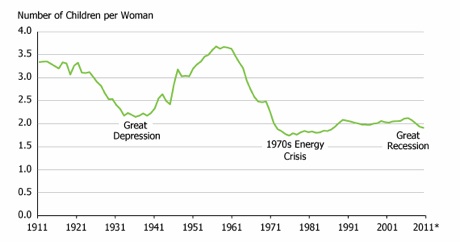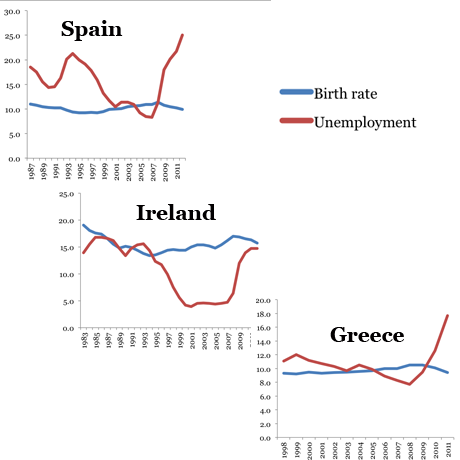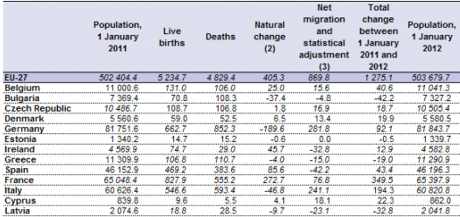Greece has reported a 10% drop in its birthrate
through its recession, raising the old question about procreation and
economics. When money is short, do people really spend more time in the
bedroom? We take a look at the data to find out
Can an economic bust lead to a baby boom? Image: Corbis/Guardian
The latest financial crisis
We looked at European birth rates and compared them to economic indicators like GDP growth and unemployment to see if the theory on sex economics is true. No need to scroll down to the bottom of the article - the answer is a pretty resounding 'no it isn't'.The 15 countries that made up the EU up until 2004 have had relatively consistent birth rates (number of babies born per 1,000 inhabitants) while their unemployment rates have fluctuated considerably.
The same thing happens when you compare new births to the most cited measure of economic strength - GDP growth.
So we looked for more data to test a few other theories...
Maybe the problem is birth rates ≠ sex
Some of you might be quick to spot a reason why birth rates aren't affected by economic success: contraception. You wouldn't be alone.We're told that condoms are "recession resistant" or that sales are sales were up 22 per cent to £320million. But look a little bit closer and you'll notice something else. The sources for these business articles are "the ad agency for Durex condoms" and "an out-of-breath salesman". We were looking for something a bit more substantial.
So, we decided to look at some older data on economics and birth rates that might reflect a period where contraception was not so widely available or so frequently used. That would mean that, assuming fertility has been consistent, birth rates are a better indication of the frequency of sexual intercourse.
Well actually, the US data that we found tells a very different story.
 Image from the US Population Reference Bureau
Image from the US Population Reference Bureau
So what is going on?
If you take three recession countries, you'll spot that they buck the EU-trend. All of them have had their birth rates drop off since 2009 even though unemployment boomed around 2007-08.
One line of reasoning would say that people simply can't afford to have babies when the economy goes bad and that's why fertility rates fall during times of crisis.
I've got a very different theory on sex economics - and it's one that several researchers would agree with. In this hypothesis, when jobs are scarce and money is scarcer, people are more likely to suffer from stress and depression. And when people are depressed, they tend to have less sex.
11.35am Emigration?
@IndebtedYouth says in the comments:Any possible link to emigration? More people aged 18-35 leaving the country means fewer people giving birth in that country?Unless you assume that immigrants don't have babies (and judging by most of the tabloids, very few people think that), it isn't necessarily emigration that counts, but rather net migration.
That doesn't mean that @IndebtedYouth doesn't have a point though - the latest figures show that in places like Greece, Spain and Ireland, immigration isn't offsetting emigration with the result that overall migration numbers are falling. Greece is however the only country of the three where the total population size is shrinking.


Δεν υπάρχουν σχόλια:
Δημοσίευση σχολίου